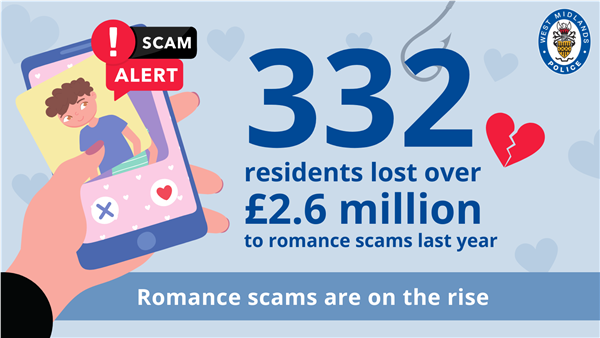|
||||
|
||||
|
|
||||
|
Dear Resident,
New figures from City of London Police, the National Lead Force for fraud, show that more than £106 million was lost to romance fraud in the UK last year, as the number of victims continues to rise. Romance scams are leaving victims devastated, both financially and emotionally. Data from the National Fraud Intelligence Bureau (NFIB) reveals a disturbing 9% increase in romance fraud reports in the past year, with 9,449 reports made in the 2024/25 financial year. Victims lost £11,222 each on average. Here in the West Midlands, 332 cases of romance fraud have been reported over the past year, with total losses reaching a staggering £2,696,865. That’s why we’re supporting the City of London Police with their latest campaign to raise awareness and educate the public on how scammers manipulate emotions to steal money.
New figures from City of London Police, the National Lead Force for fraud, show that more than £106 million was lost to romance fraud in the UK last year, as the number of victims continues to rise. Romance scams are leaving victims devastated, both financially and emotionally. Data from the National Fraud Intelligence Bureau (NFIB) reveals a disturbing 9% increase in romance fraud reports in the past year, with 9,449 reports made in the 2024/25 financial year. Victims lost £11,222 each on average. Here in the West Midlands, 332 cases of romance fraud have been reported over the past year, with total losses reaching a staggering £2,696,865. That’s why we’re supporting the City of London Police with their latest campaign to raise awareness and educate the public on how scammers manipulate emotions to steal money.
How romance scammers operate Romance fraud is a calculated scam, designed to exploit trust and emotions for financial gain. Fraudsters create fake identities, often posing as doctors, soldiers, or business professionals. They take time to build relationships, earning their victims’ trust until the moment they claim an emergency and ask for money. These scammers use classic tactics to deceive such as avoiding face-to-face meetings and making excuses. They also claim emotional emergencies such as medical bills, family issues, or travel problems and rush intimacy to fast-track trust and manipulate victims. Who is most at risk? Data reveals that the 50-59 age group suffered the biggest losses, totalling £22,108,334. This demographic is often financially stable, in the workforce, and may be going through major life changes like divorce or the loss of a partner making them prime targets for scammers. A key tactic used by fraudsters is ‘love bombing’ with overwhelming victims with affection, manipulation, and emotional control to create dependency. Intelligence suggests that female victims were nearly twice as likely to engage with fraudsters for a year or more, showing how hard it can be to accept the truth once trust has been built. Khatija Nichols from our Economic Crime Unit warns: “Romance fraud is a cruel and calculated crime that can happen to anyone. Criminals build trust and relationships to exploit victims, stealing money and personal information and leaving victims financially and emotionally devastated. “Victims are often embarrassed and feel ashamed to confide in friends and family or report to Action Fraud for fear of ridicule. We urge victims to reach out and seek help to protect themselves and help prevent others from becoming victims. “If someone you’ve met online avoids meeting in person, asks for financial help, or pushes for quick intimacy, these could be signs that they aren’t who they say they are.” How to stay safe Stay within dating app messaging platforms - avoid moving to SMS or WhatsApp too quickly. Never send money to someone you haven’t met in person - no matter how convincing their story is. Be careful with personal information - fraudsters exploit what you share. Talk to family or friends - scammers isolate victims for control. Check profile photos - reverse image searches can reveal stolen pictures. What you should NEVER do If you have never met someone in person, avoid these mistakes: Sending money or gift cards. Giving them access to your bank account. Transferring money on their behalf. Taking out a loan for them. Providing personal documents (passport, driving licence). Investing your own money based on their advice. Accepting or sending parcels for them. Where to get help If you or someone you know has been affected by romance fraud, support is available. Contact the police on 101 or dial 999 in an emergency. If you suspect romance fraud, reach out to your bank immediately. Report romance scams to Action Fraud at 0300 123 2040 or online at www.actionfraud.police.uk. How romance scammers operate Romance fraud is a calculated scam, designed to exploit trust and emotions for financial gain. Fraudsters create fake identities, often posing as doctors, soldiers, or business professionals. They take time to build relationships, earning their victims’ trust until the moment they claim an emergency and ask for money. These scammers use classic tactics to deceive such as avoiding face-to-face meetings and making excuses. They also claim emotional emergencies such as medical bills, family issues, or travel problems and rush intimacy to fast-track trust and manipulate victims. Who is most at risk? Data reveals that the 50-59 age group suffered the biggest losses, totalling £22,108,334. This demographic is often financially stable, in the workforce, and may be going through major life changes like divorce or the loss of a partner making them prime targets for scammers. A key tactic used by fraudsters is ‘love bombing’ with overwhelming victims with affection, manipulation, and emotional control to create dependency. Intelligence suggests that female victims were nearly twice as likely to engage with fraudsters for a year or more, showing how hard it can be to accept the truth once trust has been built. Khatija Nichols from our Economic Crime Unit warns: “Romance fraud is a cruel and calculated crime that can happen to anyone. Criminals build trust and relationships to exploit victims, stealing money and personal information and leaving victims financially and emotionally devastated. “Victims are often embarrassed and feel ashamed to confide in friends and family or report to Action Fraud for fear of ridicule. We urge victims to reach out and seek help to protect themselves and help prevent others from becoming victims. “If someone you’ve met online avoids meeting in person, asks for financial help, or pushes for quick intimacy, these could be signs that they aren’t who they say they are.” How to stay safe Stay within dating app messaging platforms - avoid moving to SMS or WhatsApp too quickly. Never send money to someone you haven’t met in person - no matter how convincing their story is. Be careful with personal information - fraudsters exploit what you share. Talk to family or friends - scammers isolate victims for control. Check profile photos - reverse image searches can reveal stolen pictures. What you should NEVER do If you have never met someone in person, avoid these mistakes: Sending money or gift cards. Giving them access to your bank account. Transferrng money on their behalf. Taking out a loan for them. Providing personal documents (passport, driving licence). Investing your own money based on their advice. Accepting or sending parcels for them. Where to get help If you or someone you know has been affected by romance fraud, support is available. Contact the police on 101 or dial 999 in an emergency. If you suspect romance fraud, reach out to your bank immediately. Report romance scams to Action Fraud at 0300 123 2040 or online at www.actionfraud.police.uk. | ||||
Reply to this message | ||||
|
||||
|
|
||||

|
|






